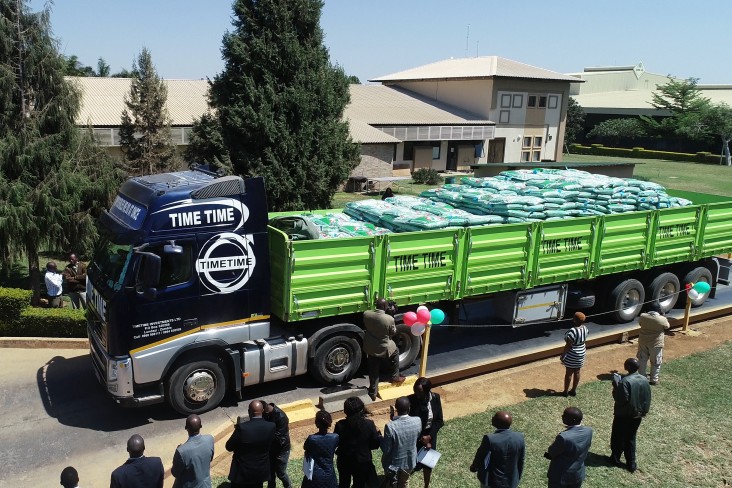Speeches Shim

SADC exports the inaugural Hybrid Maize Seed produced under the Harmonized Seed Regulatory Systems
September 9, 2019 was a historic moment for seed trade in the Southern African Development Community (SADC) region. Two trucks carrying 60 metric tons of a hybrid maize seed produced following the SADC Harmonized Seed Regulatory System (HSRS) successfully crossed the Zambia-DRC borders. This may not sound like a lot, but it was the very first export of a non-genetically modified organism (GMO) hybrid maize seed easily produced in Zambia, but not in the mineral-rich the Democratic Republic of Congo (DRC).
Plant-based foods begin life as seeds. Quality, high-yielding seeds are not only critical to the business success of seed companies, but also offer the greatest return on investment for farmers who can produce significant amounts of food that help maintain food security in their country.
But not all countries have the same productivity levels. What one country might efficiently produce in terms of better seed varieties is not available or affordable for farmers in a neighboring country. As such, supply does not always meet demand.

Before the 200 metric tons of seed, valued at about US$ 370,000 was ready for export, the SADC Food, Agriculture and Natural Resources (FANR), with support from USAID’s Feed the Future Southern Africa Seed Trade Project (Seed Trade Project), launched a pilot project in December 2018, where Seed Co. Zambia Ltd planted three varieties (SC647, SC637, and SC719) of hybrid seed maize.
Of more importance was that the seed met the new SADC seed certification and quality-control standards aimed at simplifying trade via the SADC HSRS. The HSRS means SADC Member States will be aligned in seed standards, thus cutting down on the red tape.
“The Zambian government looks forward to a future where the trade of improved seed varieties between our nations is not such a novelty, but a matter of practice.” – Zambia Agriculture Minister, Michael Z. Katambo
Previously, such standards did not always match up across various countries regionally—which led to verification and paperwork complications, delays at borders, and other barriers to efficient seed trade. What’s more, the restrictions over mismatched standards got in the way of emergency seed consignments from one country that had the seeds to another country that desperately needed them to alleviate impacts from famine and food insecurity due to crises like drought and floods.
The pilot, as well as the eventual celebration and official commissioning of the inaugural seed for export, was thanks to the partnership among the SADC Secretariat, the Zambian government, the Seed Trade Project, and Seed Co. Zambia Ltd.
The SADC FANR Director, Domingos Gove, said the seed export commissioning event will go down in history as one of the remarkable achievements in the implementation of Regional Agriculture Policy (RAP), which will drive the way towards regional integration, and attainment of regional food security and facilitation of trade, through the implementation of the Harmonized Seed Regulatory System. He further stressed the importance of seed in human life saying, “without seeds there is no agriculture; and without agriculture, there is no food; and without food, there is no human life.”
Food security and access to nutritious food that so often is taken for granted involves everyone from seed scientists, government officials to private sector seed and transport companies. All of these parties have an important role to play well before farmers can purchase seeds for planting and harvesting of crops that eventually make it to the tables of millions in the form of tasty and nutritious meals.

Comment
Make a general inquiry or suggest an improvement.